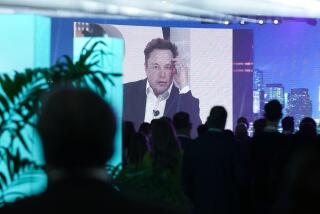Texaco Shareholders Voice Views on Pennzoil Battle
- Share via
TULSA, Okla. — Ready for a novel solution to the Texaco-Pennzoil brouhaha?
“Give Pennzoil to the Russians!”
Credit for that zinger, and the laughter it evoked even from the smattering of Pennzoil representatives at Texaco’s two-hour annual meeting here Tuesday, goes to a Texaco shareholder--one of 4,700 who heeded Chairman John K. McKinley’s invitation in shareholder proxy materials to send them their suggestions, comments or beefs.
As McKinley told the gathering of about 700, “it was no surprise” that the $11 billion that a Texas jury decided Texaco owes Pennzoil for illegally interfering with Pennzoil’s planned acquisition of Getty Oil was most on shareholders’ minds.
“Don’t give an inch,” typified the responses, McKinley said, while conceding that it was not for time considerations alone that he refrained from reading more than a handful of the comments. “Quite a few of them,” he said, “we really should not repeat” in public.
Hundreds of other shareholders expressed shock over the verdict and certainty that Texaco will eventually prevail. One writer was particularly confident--or wishful. “Remember Spindletop.” he wrote, a call-to-arms reference to the Texas gusher that spewed out oil at the rate of 100,000 barrels a day in 1901, ushering in the modern Oil Age.
There were a few brave souls who, as McKinley said, “were harshly critical” of the performance of Texaco’s lawyers. And several chided the company for attacking the integrity of the Texas judicial system and the entire state of Texas and warned about the public backlash that such remarks might trigger.
“Quit publishing bad comments about Texas,” one shareholder admonished.
Speaking at length to that criticism, Texaco President Alfred C. DeCrane Jr. acknowledged that Texaco is “quite concerned” about public reaction to Texaco in the wake of the decision. But he pointed to the results of a recent poll commissioned by Texaco showing, he said, that Texans overwhelmingly disagree with the verdict and fear that it will have a negative effect on their state.
DeCrane also insisted that the company has made “no broadside attack” on either the Texas judicial system or the state of Texas, where Texaco, now based in White Plains, N.Y., was originally headquartered and where it still has its largest concentration of employees.
Addressing the prospects for settling the case out of court, McKinley said: “Notwithstanding the merits of the case, but considering the potential impact of a prolonged period of litigation, a reasonable solution may be in the company’s best interest. Talks between the two companies, however, have broken off.”
Turning to the hard times in the oil industry--which have taken a severe toll on this Oklahoma city of 400,000, whose largest gasoline marketer is Texaco--McKinley stopped short of predicting an earnings decline for Texaco. But he did say that if crude oil prices remain at current levels of about $15 a barrel, the improved efficiencies in Texaco’s refining and marketing businesses “will probably not offset the decline in the producing area.” Texaco last quarter was able to report its highest quarterly earnings since the third quarter of 1983 despite lower earnings from oil production, he said, mainly because of those improvements in refining and marketing.
Nor did McKinley take a stand on an issue that has divided the beleaguered domestic oil industry: a proposed fee on imported oil.
Because the Reagan Administration’s energy policy “is not clear and is certainly not consistent,” he said, it’s impossible to know what form such a tariff would take or how useful it would be in any form.
“Washington generally states that its policy is a free market, with competition between different fuels,” he said. “But in practice what we get is a free market when crude prices go down and a windfall tax when prices rise.”
More to Read
Inside the business of entertainment
The Wide Shot brings you news, analysis and insights on everything from streaming wars to production — and what it all means for the future.
You may occasionally receive promotional content from the Los Angeles Times.










